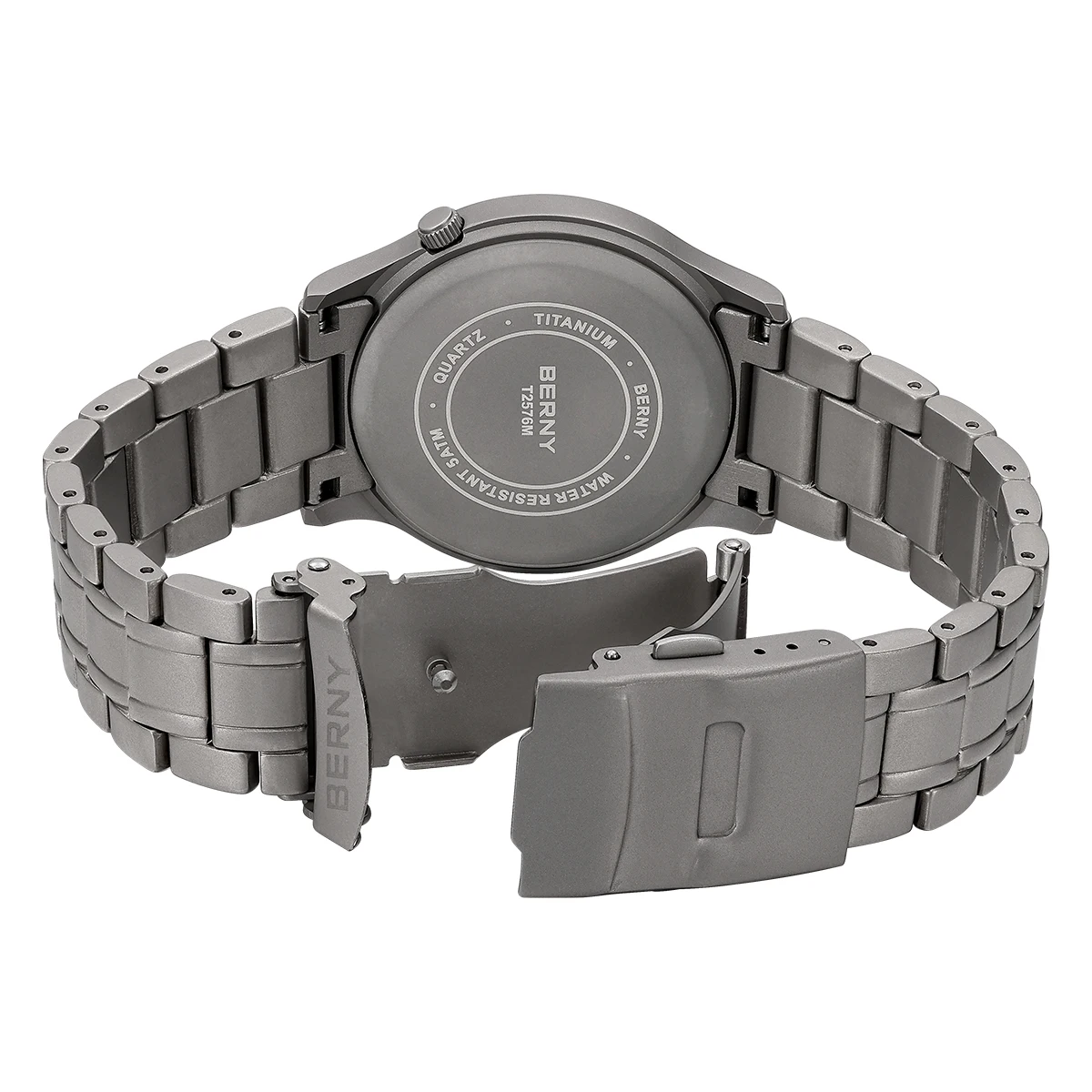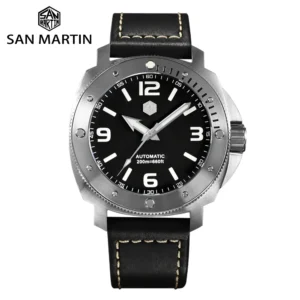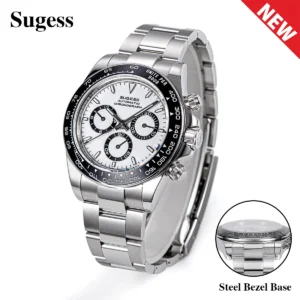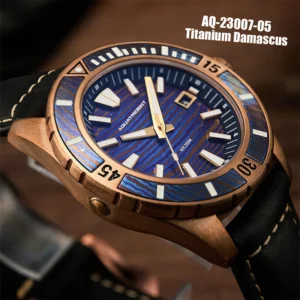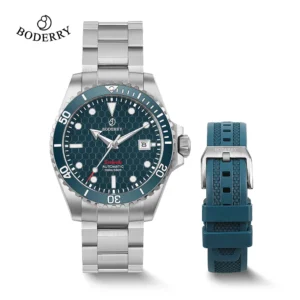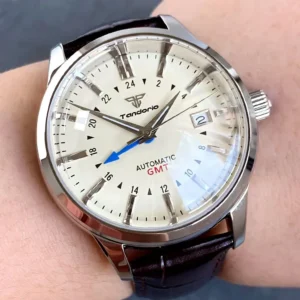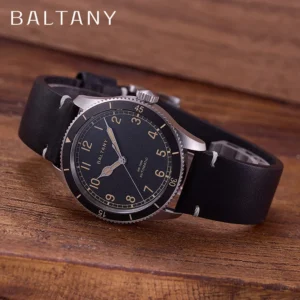The Enduring Appeal of Titanium in Modern Watchmaking
In the world of premium timepieces, titanium has emerged as a remarkable material that combines sophisticated engineering with practical benefits. Once reserved for aerospace applications, this advanced metal has found its perfect expression in watchmaking, where its unique properties address many challenges faced by traditional watch materials.
Watch enthusiasts and everyday wearers alike are increasingly drawn to titanium timepieces for several compelling reasons:
- Exceptional strength with significantly less weight than traditional metals
- Superior resistance to corrosion, even in harsh environments
- Natural hypoallergenic properties ideal for sensitive skin
- Distinctive aesthetic with sophisticated matte finish options
- Impressive durability in active lifestyle conditions
What makes titanium particularly fascinating is its dual identity as both a premium material in high-end watchmaking and a practical choice for those seeking reliable performance. The growing preference for titanium spans across multiple watch categories, from professional dive instruments to elegant daily wear pieces.
Throughout this guide, we’ll explore how titanium’s remarkable durability characteristics compare to traditional watchmaking materials, particularly stainless steel. Whether you’re considering your first titanium timepiece or seeking to understand the benefits of this exceptional metal, this comprehensive analysis will illuminate why titanium has earned its reputation as a superior watchmaking material.
For those already intrigued by titanium’s capabilities, our collection of titanium automatic watches showcases these benefits in action. Titanium has become especially prevalent in automatic dive watches where its corrosion resistance and lightweight properties prove invaluable. This material represents one significant chapter in the broader evolution of dive watch technology that has transformed timepieces over decades.
Understanding Titanium: The Science Behind the Strength
To truly appreciate titanium’s exceptional performance in watches, we need to understand what makes this metal special at a fundamental level.
Titanium is a chemical element with the symbol Ti and atomic number 22. What makes it remarkable is its combination of low density and high strength—a rare pairing in metallurgy. Despite being as strong as steel, titanium weighs approximately 40-50% less, creating an immediate advantage for wearability.
Titanium Grades in Watchmaking
Watch manufacturers typically use two main grades of titanium:
Grade 2 Titanium (Commercially Pure): Contains 99% pure titanium. It offers excellent corrosion resistance and is lighter than steel, though somewhat softer. Many watch cases use this grade for its processing advantages.
Grade 5 Titanium (Ti-6Al-4V): An alloy containing 6% aluminum and 4% vanadium. This composition significantly increases strength and hardness while maintaining titanium’s lightweight nature. Premium watches often use Grade 5 for enhanced durability.
The Physical Properties That Matter
Titanium’s impressive performance stems from several inherent characteristics:
Atomic Structure: Titanium has a hexagonal close-packed crystal structure that contributes to its strength and lightness.
Natural Oxide Layer: When exposed to oxygen, titanium immediately forms a protective titanium dioxide (TiO₂) layer just 1-2 nanometers thick. This invisible shield continuously repairs itself when damaged, providing exceptional corrosion resistance.
Elasticity: Titanium has greater elasticity than steel, allowing it to better absorb impacts without permanent deformation.
Thermal Properties: With low thermal conductivity, titanium watches feel more temperature-neutral against the skin in extreme conditions.
A common misconception is that all titanium watches are scratchproof. While titanium is exceptionally durable in many ways, untreated titanium can show scratches. However, modern surface treatments have significantly addressed this limitation, as we’ll explore later.
The properties that make titanium ideal for medical implants, aerospace components, and deep-sea equipment are the same ones that create exceptional watches. This metal’s unique combination of physical and chemical characteristics translates directly into practical benefits for timepieces exposed to the rigors of daily wear.
The history of professional diving watches demonstrates how material science has consistently pushed the boundaries of what timepieces can withstand, with titanium representing one of the most significant advances.
Exceptional Strength-to-Weight Ratio: The Lightweight Champion
Perhaps titanium’s most immediately noticeable advantage is its remarkable strength-to-weight ratio—a property that transforms the wearing experience without compromising durability.
The Numbers Behind the Comfort
The difference between titanium and stainless steel becomes clear when comparing identical watch designs:
- A typical 42mm stainless steel watch case weighs approximately 4.1 oz (115g)
- The same design in titanium weighs only about 2.3 oz (65g)
This reduction of nearly 50% in weight creates a dramatic difference in comfort, especially during extended wear. To put this in perspective, the weight difference is similar to comparing a standard office stapler to a smartphone—a distinction you can feel immediately on your wrist.
Despite this significant weight reduction, titanium maintains comparable or superior strength to stainless steel. This seemingly paradoxical combination is why aerospace engineers have long favored titanium for critical components where both weight and strength are crucial considerations.
Practical Benefits for Watch Wearers
The exceptional strength-to-weight ratio translates to several tangible advantages:
- All-day comfort without the fatigue often associated with heavier metal watches
- Better balance and stability during active movement and sports
- Less momentum and inertia during sudden movements, reducing stress on the wrist
- Enhanced wearability for larger case designs that would be prohibitively heavy in steel
This lightweight property proves particularly valuable for larger watch styles where every gram matters. Many wearers report that titanium watches “disappear” on the wrist—there, yet unobtrusive, allowing for comfort even during sleep or vigorous activities.
For those seeking watches that can withstand tough conditions without weighing down the wrist, rugged automatic watches crafted from titanium provide ideal performance. The material’s exceptional properties also contribute significantly to how long automatic watches last by reducing stress on the movement from excess weight and impacts.
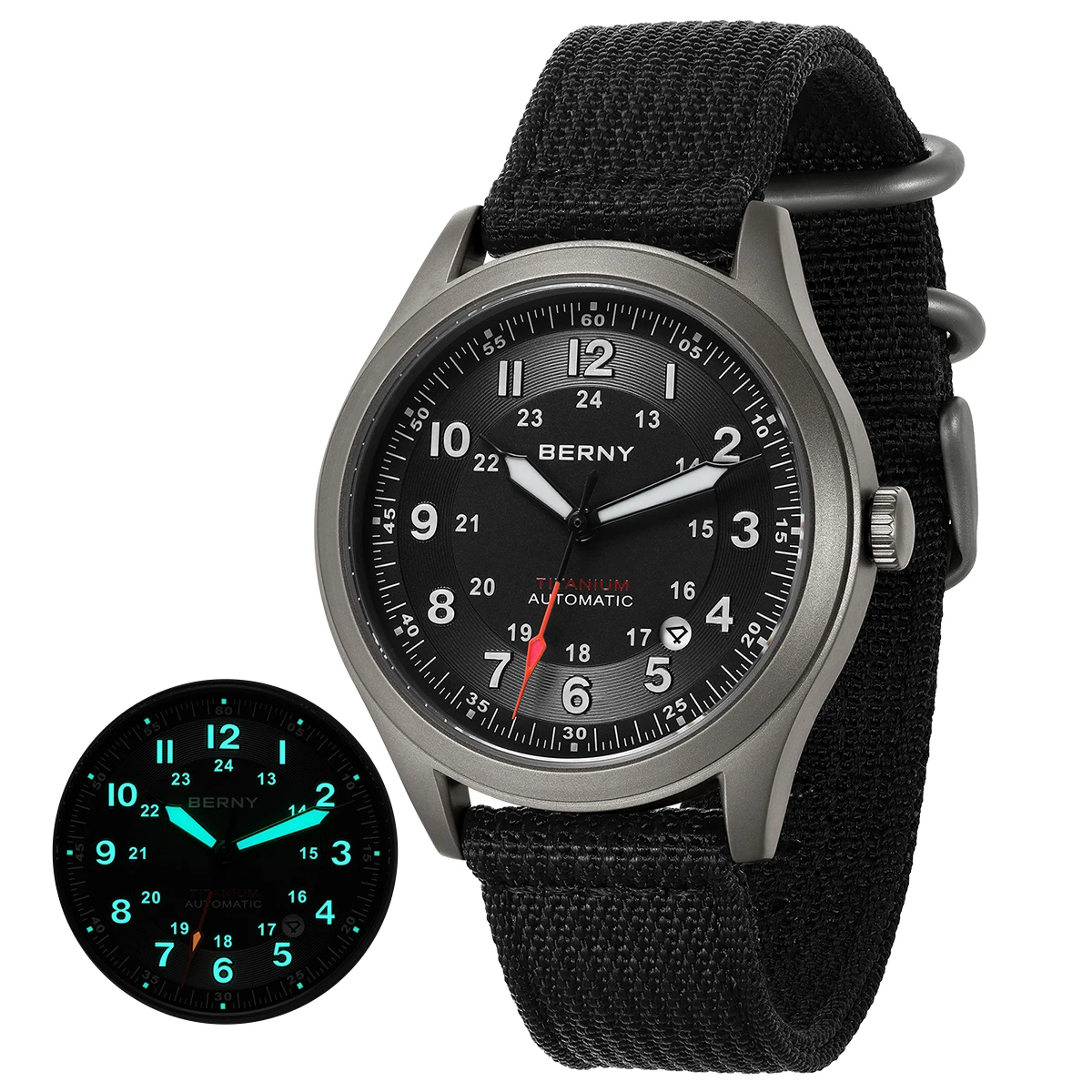
Superior Corrosion Resistance: Defying the Elements
Titanium’s exceptional resistance to corrosion stands among its most valuable attributes for watchmaking—particularly for timepieces exposed to challenging environments.
The Protective Shield
The secret behind titanium’s remarkable corrosion resistance lies in its spontaneous formation of a titanium dioxide (TiO₂) layer upon exposure to oxygen. This invisible protective barrier is:
- Self-healing when scratched or damaged
- Extremely stable in most environments
- Just a few nanometers thick, yet remarkably effective
- Continuously reforming when compromised
Unlike many metals that deteriorate when exposed to corrosive substances, titanium actively strengthens its protective layer in the presence of oxygen. This unique property creates a nearly impenetrable barrier against environmental threats.
Real-World Corrosion Resistance
Titanium watches demonstrate superior resistance to numerous challenging conditions:
- Saltwater immersion: Critical for dive watches and beach activities
- Chlorinated pool water: Protects against bleaching and deterioration
- Human perspiration: Resists the corrosive effects of body acids and salts
- Industrial chemicals: Withstands exposure to many common substances
- Acidic substances: Maintains integrity when exposed to acidic foods or drinks
The practical advantage becomes clear when comparing long-term performance. While stainless steel can eventually show corrosion spots after years of saltwater exposure, titanium watches maintain their structural integrity and appearance with minimal care. This makes titanium an ideal choice for professional-spec dive watches that must perform reliably in marine environments.
For perspective on how material choices have shaped underwater timepieces, the timeline of diving watch innovations shows titanium’s important role in advancing water resistance and longevity.
Impact and Shock Resistance: Built to Withstand Life’s Knocks
Beyond its weight and corrosion advantages, titanium offers exceptional performance when subjected to impacts and shocks—an inevitable part of an active watch’s life.
The Science of Shock Absorption
Titanium’s impressive shock resistance stems from two key properties:
- Higher elasticity than stainless steel, allowing it to flex slightly under impact before returning to shape
- Excellent damping characteristics that dissipate energy from impacts more effectively
This combination creates a material that can absorb and distribute force without permanent deformation. When a titanium watch case receives a blow, the metal’s atomic structure temporarily accommodates the stress and then returns to its original state—much like how a carbon fiber tennis racket absorbs and dissipates impact energy.
Protection Beyond the Case
The shock-absorbing properties of titanium extend benefits beyond just preventing dents and damage to the case:
- Movement protection: Reduces vibration transmission to delicate internal components
- Crystal security: Helps maintain the integrity of the crystal-to-case seal during impacts
- Water resistance longevity: Preserves gasket compression and case alignment
Many wearers mistakenly believe that titanium’s lightweight nature implies fragility. In reality, titanium’s unique atomic structure makes it extraordinarily resilient, able to withstand impacts that would dent or deform stainless steel. This quality makes it particularly suitable for tactical automatic watches designed for demanding environments.
The development of shock-resistant watch cases represents an important chapter in the milestones of underwater watch engineering, where protection against unexpected impacts is critical for instrument reliability.
Thermal and Environmental Stability: Performance Across Extremes
Titanium watches offer remarkable stability across extreme conditions—a property that preserves both comfort and performance where other materials might falter.
Temperature Resistance
Titanium demonstrates exceptional stability across temperature ranges that would challenge other metals:
- Low thermal conductivity: Titanium transfers heat slowly, keeping watches more comfortable against the skin in extreme temperatures
- Limited thermal expansion: Maintains precise dimensions and component alignment despite temperature fluctuations
- Wide operating range: Performs consistently from arctic cold to desert heat without compromising structural integrity
This thermal stability matters not just for comfort but for the watch’s mechanical reliability. The minimal expansion and contraction help maintain precise tolerances between movement components and case dimensions.
Non-Magnetic Advantage
Unlike many stainless steel alloys that can become magnetized, titanium is effectively non-magnetic. This property:
- Protects watch movements from magnetic interference
- Maintains timekeeping accuracy near electronic devices
- Eliminates the need for special anti-magnetic shielding in many applications
In our increasingly electronic world, this natural resistance to magnetism provides a subtle but significant advantage for maintaining accurate timekeeping.
Environmental Versatility
Titanium watches maintain their integrity across diverse environmental conditions:
- Humidity resistance: No rust or corrosion in tropical environments
- UV stability: Minimal degradation from prolonged sun exposure
- Chemical stability: Resistant to most environmental contaminants
- Atmospheric resistance: Unaffected by air pollution or industrial environments
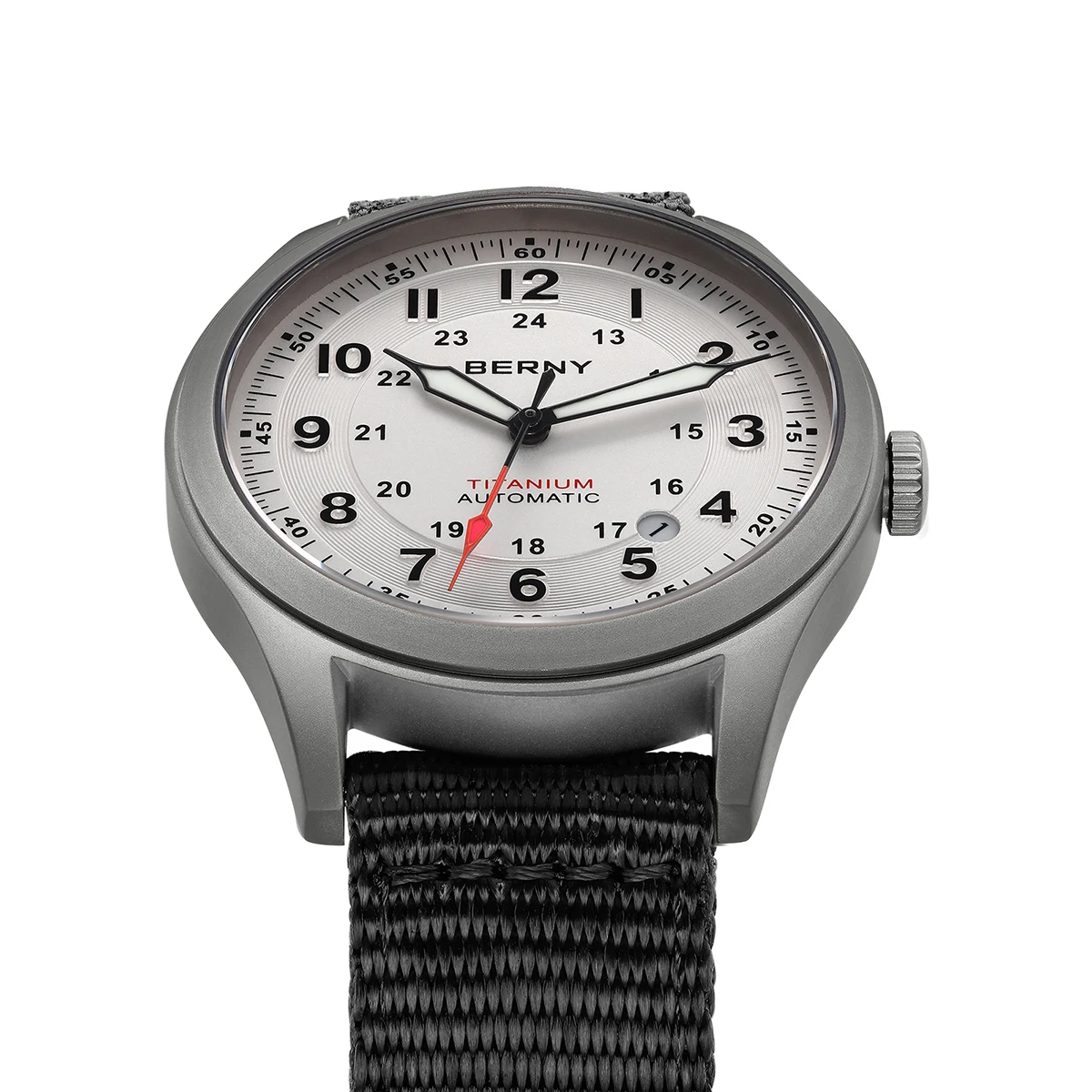
This environmental versatility makes titanium an excellent choice for automatic field military watches designed to perform reliably across diverse operational conditions. The material’s exceptional stability builds upon decades of material science advancements documented in the influence of marine exploration on dive watches, where environmental resistance proved critical.
The Truth About Titanium and Scratches: Beyond the Surface
When discussing titanium’s durability, the topic of scratch resistance requires nuanced understanding. While titanium excels in many durability aspects, its scratch resistance characteristics differ from stainless steel in important ways.
Understanding Hardness vs. Strength
Titanium presents an interesting paradox: it’s extremely strong (resistant to breaking or permanent deformation) but not inherently as hard (resistant to surface scratches) as some stainless steel alloys:
- Pure titanium (Grade 2) has a Vickers hardness of approximately 210HV, compared to 316L stainless steel at around 250HV
- Titanium alloy (Grade 5) improves to approximately 350HV, surpassing standard stainless steel
This means untreated titanium can show surface scratches more readily than steel, even while maintaining superior structural integrity.
Surface Treatment Innovations
Modern watchmakers employ several technologies to address titanium’s natural scratch vulnerability:
| Treatment | Hardness Increase | Visual Effect | Durability Impact |
|---|---|---|---|
| Diamond-Like Carbon (DLC) | 1000-3000HV | Black or dark gray finish | Dramatically improved scratch resistance |
| Physical Vapor Deposition | 2000-3500HV | Various color options | Enhanced surface hardness |
| Titanium carbide layer | 1800-2500HV | Minimal visual change | Improved scratch resistance while maintaining titanium look |
| Proprietary hardening | 500-1200HV | Maintains natural titanium appearance | Significantly improved surface durability |
These treatments transform titanium’s surface characteristics without sacrificing its underlying benefits, creating watches with exceptional scratch resistance.
The Visual Advantage
An often-overlooked aspect is how scratches appear on titanium versus stainless steel:
- Titanium’s natural oxide layer can help minor scratches blend into the surface over time
- The typical matte finish of titanium masks minor scratches better than polished steel
- Titanium’s darker hue makes surface marks less visually prominent than on bright steel
- The natural patina that develops on titanium often enhances its aesthetic appeal
Many titanium watch owners report that while scratches do occur, they’re less visually disruptive than on highly polished stainless steel surfaces.
For those interested in how modern watches have evolved to address durability challenges, the evolution of dive watches technical journey provides fascinating insights into material innovations. Similarly, those seeking robust timepieces should consider how rugged watch cases for outdoor adventures incorporate titanium’s benefits while addressing its limitations.
Titanium vs. Stainless Steel: The Ultimate Durability Showdown
When evaluating watch materials, the titanium versus stainless steel comparison represents a critical decision point for many enthusiasts. Each material offers distinct advantages that align with different priorities and usage scenarios.
Comprehensive Comparison
| Property | Titanium | Stainless Steel | Practical Implication |
|---|---|---|---|
| Weight | 4.5 g/cm³ | 7.9 g/cm³ | Titanium is ~45% lighter for identical designs |
| Tensile Strength | 240-680 MPa | 290-550 MPa | Comparable or superior strength depending on grade |
| Corrosion Resistance | Exceptional | Good to Very Good | Titanium excels in marine environments and with perspiration |
| Scratch Resistance (Untreated) | Moderate | Good | Stainless steel has natural advantage without treatments |
| Scratch Resistance (Treated) | Excellent | Very Good | Modern treatments give titanium comparable or better resistance |
| Impact Resistance | Excellent | Good | Titanium better absorbs and dissipates shock energy |
| Hypoallergenic Properties | Natural | Variable (depends on nickel content) | Titanium is ideal for sensitive skin |
| Thermal Properties | Low conductivity | High conductivity | Titanium feels more neutral in temperature extremes |
| Magnetic Properties | Non-magnetic | Often slightly magnetic | Titanium offers better protection for movements |
| Cost | Higher | Lower | Titanium typically commands 20-30% price premium |
| Aesthetic | Matte, warm gray | Bright, cool silver | Distinct visual appearances suit different preferences |
Real-World Performance Scenarios
For Beach and Water Activities:
Titanium’s superior corrosion resistance makes it the clear winner for frequent exposure to saltwater, chlorine, and humid environments. While high-quality stainless steel performs admirably, titanium maintains its integrity with less maintenance.
For Active Sports and Impacts:
Titanium’s superior shock absorption and lighter weight provide tangible benefits during high-impact activities. The reduced mass means less momentum during sudden movements, while the metal’s elasticity better protects the case and movement.
For Everyday Comfort:
The weight difference becomes most apparent during all-day wear. Many find titanium’s lighter presence more comfortable for continuous wear, though some prefer steel’s substantial feel as a reassuring quality indicator.
For Scratch Concerns:
Modern treated titanium surfaces can match or exceed stainless steel’s scratch resistance. However, untreated titanium may show surface marks more readily, though they tend to be less visually prominent thanks to titanium’s matte finish.
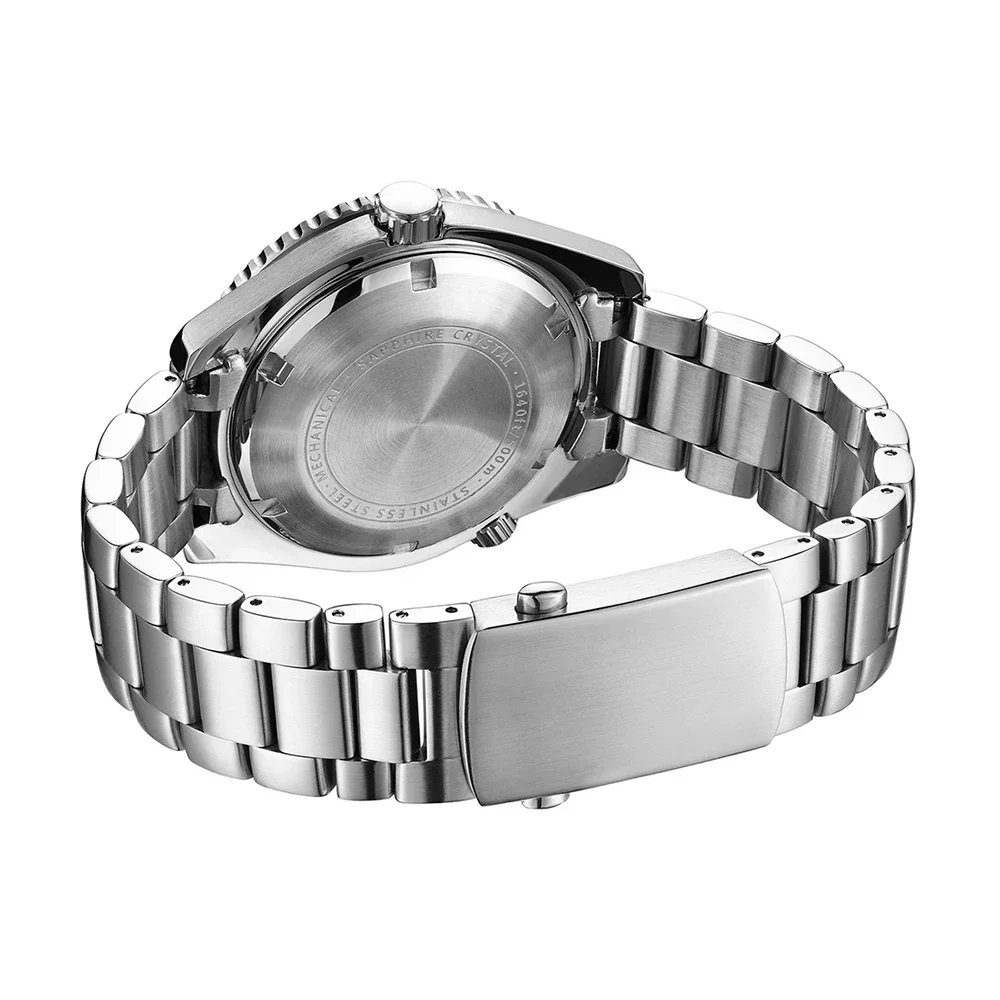
For those considering material options, our collection of classic style dive watches showcases both titanium and steel variants. The choice ultimately depends on individual priorities—whether lightweight comfort, maximum scratch resistance, or aesthetic preferences guide your decision. To understand how material choices have evolved over time, the dive watch heritage evolution provides valuable historical context.
Hypoallergenic Benefits: Comfort Meets Durability
Beyond its structural advantages, titanium offers significant biocompatibility benefits that enhance both comfort and longevity—a crucial consideration for an item worn directly against the skin.
The Biocompatible Advantage
Titanium’s hypoallergenic nature stems from its remarkable biochemical inertness:
- Zero nickel content: Eliminates the most common cause of metal allergies (present in most stainless steels)
- Chemically inert surface: The titanium dioxide layer prevents direct metal-to-skin contact
- Resistance to body chemistry: Unaffected by perspiration, oils, and skin acids
- Medical-grade material: The same metal trusted for surgical implants and medical devices
For individuals with sensitive skin or metal allergies, this property isn’t merely a comfort feature—it’s a necessity that determines whether a watch can be worn at all.
The Durability Connection
The hypoallergenic nature of titanium directly enhances watch longevity in several ways:
- Reduced corrosion from prolonged skin contact: Body chemistry that might gradually degrade other metals has minimal effect on titanium
- Elimination of galvanic reactions: Prevents the electrochemical corrosion that can occur between skin and some metals
- Maintenance of structural integrity: The stable oxide layer prevents material degradation over time
Many wearers report that titanium watches maintain their case integrity better over years of skin contact, without the subtle deterioration sometimes seen with stainless steel cases exposed to persistent perspiration.
The history of hypoallergenic materials in watchmaking forms an important part of the broader dive watch innovation timeline, where material biocompatibility emerged as an important consideration alongside pure performance characteristics.
Ideal Applications: Where Titanium Watches Truly Excel
While titanium offers numerous advantages, certain watch categories and usage scenarios particularly benefit from its unique properties. Understanding these ideal applications helps match titanium’s strengths to specific needs.
Professional Dive Watches
Titanium finds perhaps its most natural home in serious diving instruments, where its properties address multiple critical requirements:
- Saltwater corrosion immunity: Maintains integrity even with frequent ocean exposure
- Pressure resistance: Withstands depth pressure while maintaining lighter weight
- Neutral buoyancy: Closer to neutral than heavier steel, beneficial underwater
- Non-magnetic properties: Important for compatibility with diving equipment
- Comfort during long dives: Lighter weight reduces fatigue during extended wear
These advantages have made titanium the preferred material for many professional-grade diving instruments.
Sports and Active Lifestyle Timepieces
For those with active lifestyles, titanium provides several meaningful benefits:
- Impact absorption during sports: Better protects the watch during sudden movements
- All-day comfort during activities: Reduced weight minimizes wrist fatigue
- Sweat resistance: No corrosion or discoloration from persistent perspiration
- Temperature stability: Remains comfortable against the skin during temperature changes
- Durability during frequent exposure: Maintains appearance despite rough treatment
These properties make titanium ideal for watches that accompany their wearers through demanding physical activities.
Travel Watches
Frequent travelers benefit from titanium’s versatility across environments:
- Climate adaptability: Performs consistently from tropical humidity to dry cold
- Resistance to environmental exposures: Withstands varied chemicals and conditions
- Comfort during long journeys: Lighter weight reduces fatigue during extended wear
- Security compatibility: Minimal response to metal detectors (though still detectable)
- Resilience to changing conditions: Maintains integrity despite rapid environmental transitions
Military Inspired Automatic Watches, Rugged Automatic Watches, Tactical Automatic Watches
Price range: $852.14 through $994.60 Select options This product has multiple variants. The options may be chosen on the product pageAutomatic Chronograph Watches, Classic Style Dive Watches
$3,053.06 Select options This product has multiple variants. The options may be chosen on the product pageBronze Automatic Watches, Military Inspired Automatic Watches, Professional Spec Dive Watches
Price range: $1,442.21 through $1,442.82 Select options This product has multiple variants. The options may be chosen on the product pageProfessional Spec Dive Watches, Titanium Automatic Watches
$574.74 Select options This product has multiple variants. The options may be chosen on the product pageClassic Automatic Dress Watches, GMT Automatic Watches, GMT Dive Watches
Price range: $468.93 through $552.94 Select options This product has multiple variants. The options may be chosen on the product pageClassic Pilot Watches, Military Inspired Automatic Watches
$561.00 Select options This product has multiple variants. The options may be chosen on the product page
Watches for Sensitive Skin
For those with allergies or skin sensitivities, titanium isn’t merely preferable—it’s often essential:
- Completely nickel-free construction: Eliminates the primary metal allergen
- Non-reactive surface: Prevents skin irritation even during extended wear
- Stable composition: No leaching of potential irritants over time
- Perspiration compatibility: Remains inert even with prolonged sweat exposure
- Medical-grade biocompatibility: The same standard trusted for surgical implants
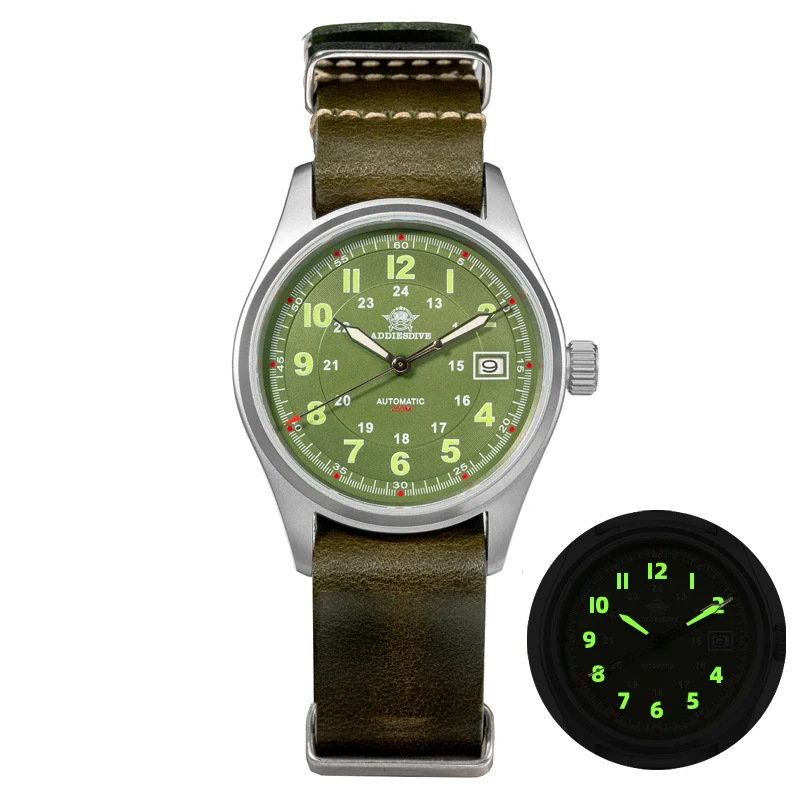
For those seeking specialized timepieces that capitalize on titanium’s strengths, our GMT dive watches collection demonstrates how this material enhances the performance of technical timepieces designed for multiple environments.
Modern Innovations: Taking Titanium Durability Further
The watchmaking industry continues to advance titanium’s capabilities through innovative alloys, treatments, and manufacturing techniques that enhance its natural properties and address traditional limitations.
Advanced Titanium Alloys
Beyond standard grades, watchmakers now employ specialized titanium compositions:
- Beta titanium: Enhanced flexibility and lower elastic modulus for improved shock absorption
- Titanium-zirconium alloys: Improved hardness while maintaining lightness
- Titanium-aluminum-vanadium with optimized ratios: Tailored balance of strength and workability
- Ceramic-reinforced titanium composites: Exceptional surface hardness with titanium’s core benefits
These advanced materials push the boundaries of what titanium watches can withstand while preserving their fundamental advantages.
Revolutionary Surface Treatments
Surface hardening technologies have transformed titanium’s scratch resistance profile:
- Deep-layer hardening: Treatments that penetrate beyond the surface for lasting durability
- Diamond-like carbon coatings: Near-diamond hardness with excellent adhesion to titanium
- Plasma electrolytic oxidation: Creates exceptionally hard ceramic-like surfaces
- Nitrogen diffusion hardening: Significantly improves surface hardness while maintaining appearance
These treatments can increase surface hardness by 5-10 times, addressing titanium’s traditional limitation.
Innovative Manufacturing Techniques
Advanced production methods are unlocking new possibilities for titanium watches:
- 3D printing of titanium components: Enables previously impossible geometric structures
- Cold forging techniques: Creates denser, stronger titanium cases
- Laser micro-texturing: Enhances scratch resistance through surface patterning
- Diffusion bonding: Allows seamless integration of titanium with other materials
These production innovations enable watchmakers to exploit titanium’s full potential while minimizing its traditional drawbacks.
The application of these advanced technologies is particularly evident in military-inspired automatic watches where cutting-edge materials meet rigorous performance requirements in stylish, functional packages.
Beyond Durability: Other Factors to Consider
While titanium’s durability benefits are substantial, a complete evaluation should consider several additional factors that influence the overall ownership experience.
Investment Considerations
- Higher initial cost: Titanium watches typically command a 20-30% premium over comparable stainless steel models
- Manufacturing complexity: The specialized equipment and expertise required for titanium work contribute to higher prices
- Long-term value retention: The premium material often supports stronger resale value
- Reduced lifetime maintenance costs: Potentially fewer repairs and replacements due to enhanced durability
Aesthetic Qualities
- Distinctive matte finish: Titanium naturally has a more subdued appearance than polished steel
- Warm gray tone: Slightly darker and warmer hue than the bright silver of stainless steel
- Patina development: Titanium develops a subtle character over time that many enthusiasts appreciate
- Limited high-polish options: While possible, achieving and maintaining a mirror finish is more challenging
Care Requirements
- Cleaning simplicity: Generally requires only mild soap and water for maintenance
- Scratch management: Minor scratches can often be addressed with titanium-specific polishing cloths
- Restoration options: Deep scratches require specialized refinishing by experienced technicians
- Treatment preservation: Some surface treatments require avoiding harsh chemicals or abrasives
Service Considerations
- Specialized tools: Titanium service requires specific hardened tools and expertise
- Case refinishing: Fewer watchmakers offer titanium refinishing compared to steel
- Component replacement: Some titanium parts may have longer replacement lead times
- Treatment restoration: Surface treatments may need reapplication after significant service
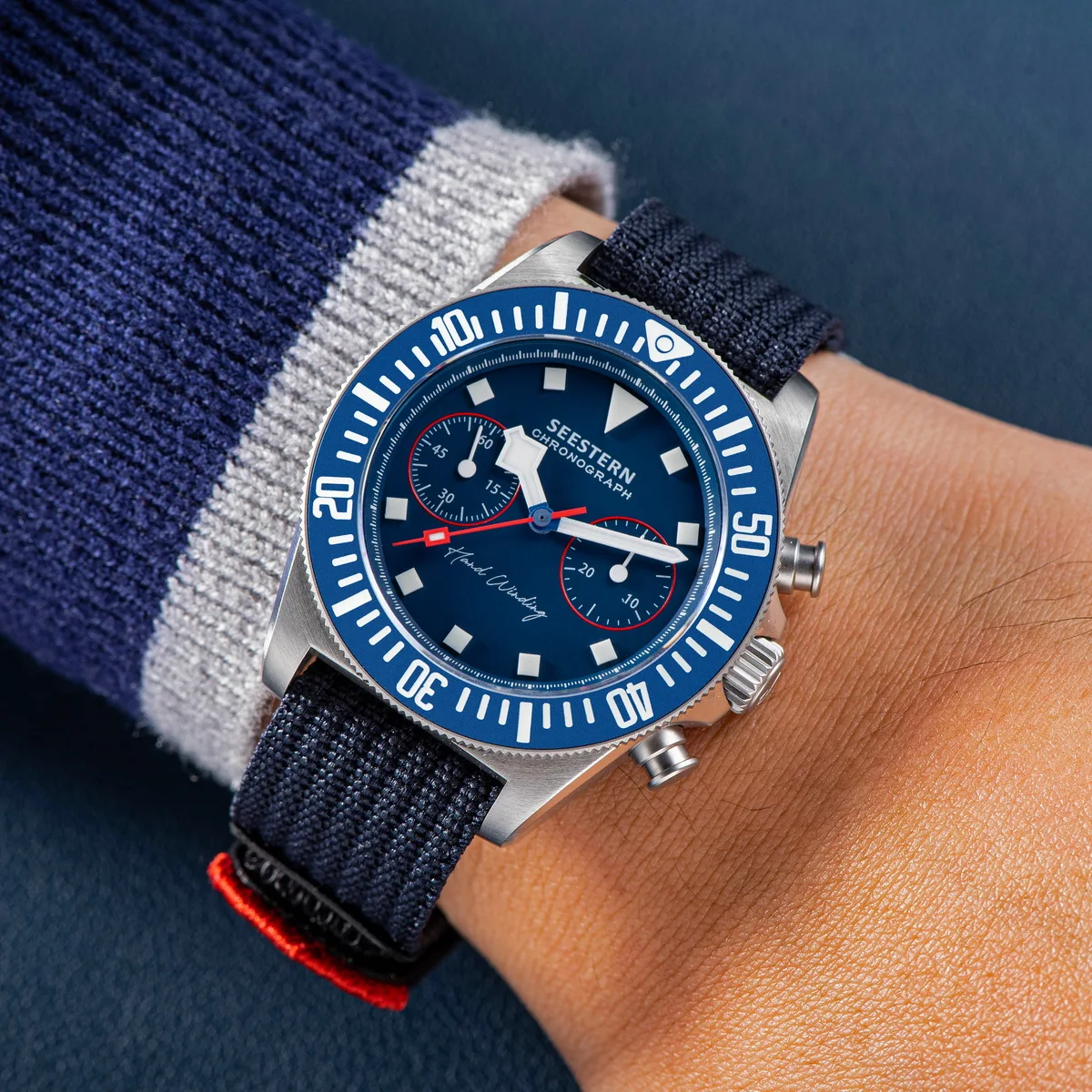
Is a Titanium Watch Right for You? Key Questions to Consider
To determine if a titanium timepiece aligns with your specific needs, consider these essential questions that synthesize the information presented throughout this guide:
Do you prioritize comfort and wearability over substantial wrist presence?
If you prefer a watch that “disappears” on the wrist and causes minimal fatigue during extended wear, titanium’s lightweight nature provides a significant advantage over heavier materials.
Are you frequently exposed to water, especially saltwater or chlorine?
Titanium’s exceptional corrosion resistance makes it ideal for swimmers, divers, and those in marine environments where other metals might gradually deteriorate.
Do you participate in active sports or activities where your watch faces impacts?
Titanium’s superior shock absorption and reduced mass during impacts better protect both the watch and your wrist during dynamic activities.
Do you have sensitive skin or metal allergies?
Titanium’s hypoallergenic properties make it the ideal choice for those who experience irritation from conventional watch metals, particularly nickel-containing stainless steel.
Are you willing to invest more upfront for potentially better long-term performance?
The premium cost of titanium represents an investment in durability, comfort, and performance that many find worthwhile over the lifetime of ownership.
Do you prefer a more understated, matte aesthetic over high polish?
Titanium’s natural finish tends toward a sophisticated subtlety rather than flash, though this aligns perfectly with many contemporary watch designs.
Is weight a critical factor in your watch selection?
If you’ve found traditional metal watches too heavy or cumbersome, titanium offers a transformative wearing experience without sacrificing durability.
For those seeking alternatives that offer different benefits, our classic field watches collection includes options in various materials to suit different preferences and needs.
Final Thoughts: The Enduring Value of Titanium Timepieces
Throughout this exploration of titanium’s remarkable properties, a clear picture emerges of a material uniquely suited to the demands of modern watchmaking. Its exceptional combination of strength, lightness, corrosion resistance, and biocompatibility creates timepieces that truly stand the test of time—both in performance and relevance.
The durability benefits of titanium watches extend beyond mere toughness. They represent a thoughtful approach to material selection that prioritizes both performance and wearing experience. While no material is perfect for every application, titanium’s balanced profile addresses many of the most common challenges faced by watch wearers:
- The fatigue of heavy watches during extended wear
- The vulnerability of traditional materials to environmental damage
- The discomfort experienced by those with metal sensitivities
- The need for reliable performance across diverse conditions
- The desire for distinctive aesthetics with practical benefits
Modern advancements in titanium processing, alloys, and surface treatments have further enhanced these natural advantages while addressing traditional limitations like scratch resistance. These innovations have transformed titanium from a specialized material into a mainstream option worthy of serious consideration by any watch enthusiast.
The premium that titanium commands reflects not just its material cost and manufacturing complexity, but the genuine value it delivers through enhanced performance and longevity. For many wearers, this investment pays dividends through years of comfortable, reliable service in conditions that would challenge lesser materials.
As you consider your next timepiece, the question isn’t simply whether titanium is “better” than alternatives—it’s whether its specific combination of properties aligns with your personal priorities, activities, and aesthetic preferences. For those who value its unique benefits, titanium represents not just a material choice, but a fundamentally different approach to the daily experience of wearing a fine timepiece.

